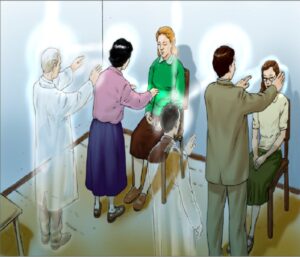Spiritual and Ethical Themes
allan kardec repentance, atonement in spiritism, charity and spiritual renewal, law of progress spiritism, reincarnation and repentance, remorse vs repentance spiritism, repentance after death spiritism, repentance in spiritism, soul evolution spiritism, spiritual reparation, The Gospel According to Spiritism, the spirits book questions
HailtonSouza
0 Comments
The power of repentance in human spiritual evolution
Repentance is one of the deepest keys to spiritual transformation.
According to Spiritism, it can manifest both during physical life and after death, always marking the starting point of a greater process: atonement and reparation of past faults.
But what does it truly mean to repent in the Spiritist view? Is remorse enough, or must we act to repair our mistakes? And what are the consequences for the soul, both in the physical and spiritual states?
In this article, you will discover:
- What repentance means in Spiritism.
- The difference between repentance and remorse.
- Its consequences during life and after death.
- How repentance relates to atonement and reparation.
- The role of prayer, charity, and moral progress.
- Answers to the most common questions about repentance.

What is Repentance in Spiritism?
In Spiritism, repentance is the awakening of the moral conscience after wrongdoing. It is when the Spirit recognizes a fault and longs for another chance to set things right.
Rather than paralyzing guilt, repentance is a dynamic force—a push toward renewal and harmony with divine laws.
As written in the Spiritist Review (July 1863):
“Repentance rises to God; it is more pleasing to Him than the smoke of sacrifices and more precious than incense spread in sacred temples. It is a fruitful suffering, a reactive and active force.”
Thus, repentance is not merely sorrow—it is the first step of a transformative journey toward atonement and spiritual renewal.
Repentance vs. Remorse
Spiritism makes a clear distinction:
- Remorse: paralyzing suffering that often does not lead to change. It is the prelude to punishment.
- Repentance: conscious, liberating recognition of error, inspiring change, reparation, and moral progress.
Remorse consumes; repentance frees.
Repentance in the Spiritual State
According to The Spirits’ Book (Q. 991), repentance in the afterlife naturally leads to the desire for a new incarnation to purify oneself.
Yet, repentance is not always immediate. Some Spirits resist, clinging to pride or illusion. However, suffering eventually awakens awareness, and repentance becomes inevitable.
Repentance in the Corporeal State
When repentance happens during physical life, it allows something powerful: moral advancement in the present incarnation.
“When the conscience reproves and shows an imperfection, improvement is always possible.” (The Spirits’ Book, Q. 992)
That means recognition must be followed by action—through charity, humility, and service.
Repentance, Atonement, and Reparation
Repentance, atonement, and reparation are three inseparable steps:
- Repentance → awareness of wrongdoing.
- Atonement → educational consequences of errors.
- Reparation → concrete actions to restore balance through good deeds.
Without repentance, there is no progress; without atonement, no learning; without reparation, no true peace.
Can We Repair Faults During Life?
Yes. As taught in The Spirits’ Book (Q. 1000):
“Evil is repaired only by good, and reparation has no merit if it does not affect man’s pride or material interests.”
Thus, real reparation requires:
- Practical charity that eases others’ pain.
- Selflessness over selfish desires.
- Moral transformation that uproots wrongdoing.
Do All Spirits Repent Eventually?
Yes. Even hardened Spirits will one day awaken to the truth. Repentance may be delayed, but it is inevitable because progress is divine law.
“It is to enlighten them that good Spirits work—and you can work as well.” (The Spirits’ Book, Q. 994)
Charity and Repentance
Repentance becomes stronger when lived through charity. As one Spirit guide taught:
“Repentance, charity, and faith will lead you to the happiness reserved for good Spirits.”
Thus, love in action is the most effective path to repair past mistakes.
Why Acting in Life Matters
A deathbed repentance does not erase debts:
“Repentance hastens rehabilitation, but does not absolve.” (The Spirits’ Book, Q. 1002)
This shows the importance of living repentance through concrete actions now—not postponing until the spiritual state.
The Law of Progress and Hope
No soul is eternally condemned. Repentance is proof that every Spirit is destined for perfection, advancing at its own pace but never forgotten.
Recommended Spiritist Readings
For deeper study, two essential works by Allan Kardec are:
- The Spirits’ Book – especially questions 990–1002.
- The Gospel According to Spiritism – chapters on forgiveness, charity, and love.
“Want to go deeper? Reading The Gospel According to Spiritism reveals how sincere repentance transforms the soul’s journey.”
Conclusion: Repentance as Inner Rebirth
Repentance in Spiritism is not endless guilt—it is the seed of renewal. When followed by atonement and reparation, it leads the Spirit to freedom and peace.
“To study more on repentance and spiritual progress, we recommend reading The Spirits’ Book, a cornerstone of Spiritism that clarifies divine justice and moral repair.”
FAQ: Repentance in Spiritism
1. What is repentance in Spiritism?
The recognition of fault and sincere desire for reparation, leading to growth.
2. What is the difference between repentance and remorse?
Remorse paralyzes; repentance liberates and inspires change.
3. Does repentance erase past faults?
No. It opens the way, but faults must still be atoned and repaired.
4. Can we repair faults during life?
Yes, through charity, humility, and transformation.
5. Do Spirits who refuse to repent during life eventually repent?
Yes. Repentance may be late, but it is certain, for divine law requires progress.
Share this content:













Post Comment